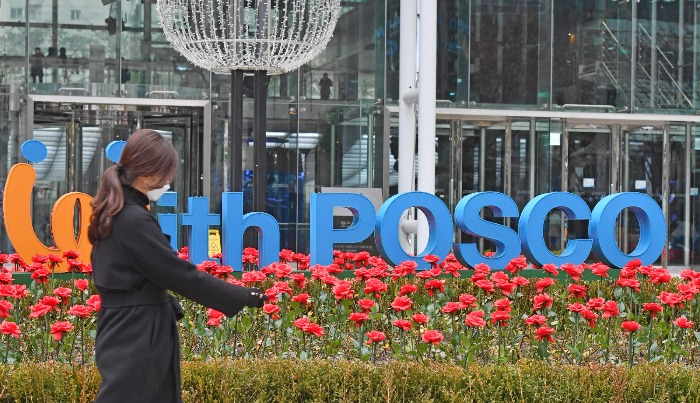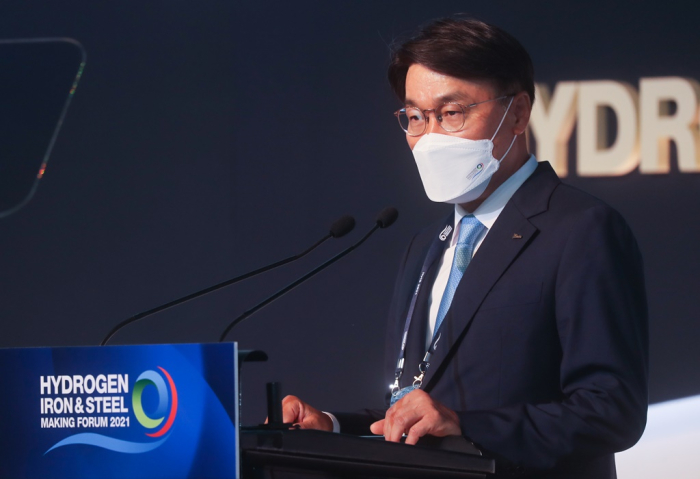Corporate restructuring
POSCO approves holding company plan for eco-friendly business
To further develop battery materials, hydrogen business; major shareholders such as NPS, BlackRock may veto
By Dec 10, 2021 (Gmt+09:00)
5
Min read
Most Read
Samsung shifts to emergency mode with 6-day work week for executives


Alibaba eyes 1st investment in Korean e-commerce platform


Blackstone signs over $1 bn deal with MBK for 1st exit in Korea


NPS loses $1.2 bn in local stocks in Q1 on weak battery shares


MBK eyes stake in Korean software developer Tmaxsoft



South KoreaŌĆÖs POSCO Co. is set to split off the company to launch an investment holding firm, 21 years after its privatization. The move aims to transform the worldŌĆÖs fifth-largest steelmaker by output into an eco-friendly materials producer while improving its enterprise value.
But to do so, POSCO still needs to clear hurdles such as winning approval from shareholders including South KoreaŌĆÖs National Pension Service (NPS), the worldŌĆÖs No. 3 pension fund, and BlackRock Inc., the worldŌĆÖs largest asset manager.
POSCO Group on Dec. 10 approved a restructuring plan to split off POSCO into POSCO Holdings and a steelmaking company with the holding firm owning 100% stakes in affiliates.
POSCO Holdings is set to be at the top of the group corporate governance structure while affiliates such as POSCO Chemical Co., POSCO Energy Co., POSCO Engineering and Construction Co. and POSCO International Co. will be placed under the holding company.
POSCO Holdings plans to focus on discovering future growth engines, investment management, as well as research and development (R&D) for the whole group. It will keep new businesses such as hydrogen production and secondary battery materials development within the company as business units. It will nurture those sectors with dividends from the affiliates and make them subsidiaries once they reach a certain level of success.
HYDROGEN, BATTERY MATERIALS
In April, POSCO Chairman and CEO Choi Jeong-woo emphasized that the group should shift its business structure from a traditional steel-focused business to ŌĆ£Green & Mobility.ŌĆØ
ŌĆ£In the transition phase of the megatrend to a low-carbon and eco-friendly environment, POSCO Group should go beyond the steel business and take a leap toward becoming a leading company of eco-friendly businesses such as steel and components for electric cars, secondary battery materials, hydrogen energy, and more,ŌĆØ Choi said in a message to mark the companyŌĆÖs 53rd anniversary.

POSCO has been taking on the challenges necessary to transform from a steelmaker based on a large blast furnace production system into a global eco-friendly materials producer. It aims to commercialize hydrogen-based steel by 2050. The hydrogen-based steelmaking process uses green hydrogen instead of coal as a reducing agent to separate oxygen from iron ore, to produce no carbon emissions.
To this end, it plans to secure green hydrogen production capacity of 500,000 tons by 2030 and expand it to 7 million tons by 2050.
POSCO aims to enhance its value chain of secondary battery materials with a target to manufacture 680,000 tons of cathode and anode materials with its own production of 220,000 tons of lithium and 140,000 tons of nickel by 2030.
Both the steelmaking unit and the new business units are expected to benefit from the split-off. The group is predicted to provide more support to the new businesses, which have been regarded as non-mainstream sectors. The group will reduce carbon risk as the reorganization will diversify the business portfolio centered on steel.
ŌĆ£We had difficulties in discovering new businesses and creating sufficient synergy within group companies as our capabilities have been concentrated in the steel business,ŌĆØ said a company source. ŌĆ£The board members agreed that this is the best time to reorganize the management structure, given the emerging revolutionary changes including the shift toward carbon neutrality.ŌĆØ
STEELMAKING UNIT TO REMAIN UNLISTED
After the split-off, the steelmaking unit will remain unlisted, given concerns over the dilution of the equity value among shareholders. The core steel businessŌĆÖ profits are to be reflected in the holding companyŌĆÖs earnings if the unit does not go public after the split-off. POSCO also decided not to list new key businesses such as hydrogen production to alleviate shareholder concerns over parent-subsidiary listings.
Since the group does not have an owner, unlike other local conglomerates, POSCO selected the split-off measure for the separation rather than a spin-off, as the latter, which requires listings of the holding companies and operating subsidiaries, could threaten the companyŌĆÖs management control over its affiliates, industry sources said.
A holding company must own at least 30% of listed subsidiaries, according to the new fair trade laws that will take effect from next year. POSCOŌĆÖs treasury shares are about 13% of its total outstanding stocks.
POSSIBLE OBJECTIONS FROM NPS
However, the separation plan could face objections from its major shareholders, according to industry sources.
POSCO, once a state-run company, was privatized in October 2000 when the South Korean government sold its stake in the company. The company has maintained distributed governance since then without significant controlling shareholders. As of the third quarter, the NPS, its top shareholder, has a 9.75% stake and BlackRock holds slightly more than 5%. The rest is held by institutional investors, individuals and foreigners.
POSCO needs to get approval for the split-off plan at a general shareholdersŌĆÖ meeting on Jan. 28, 2022. Such a plan must get the nod from more than a third of the total number of issued shares and at least two-thirds of shareholders present at the meeting.
The NPS voted against similar moves in the past, saying the separation of a core business from a parent company would hurt shareholder value.
The pension fund opposed LG Chem Ltd.ŌĆÖs plan to create the separate battery firm┬ĀLG Energy Solution, as well as SK Innovation Co.ŌĆÖs plan to split off its battery unit.
LG Chem and SK Innovation obtained endorsements from shareholders despite the NPSŌĆÖ objections as their affiliates were top shareholders. LG ChemŌĆÖs largest shareholder was LG Corp. with a 30% stake, while SK InnovationŌĆÖs top shareholder was SK Inc. with a 33.4% stake.
POSCO, however, does not have such a controlling shareholder.
ŌĆ£If the NPS with its dominant market position speaks out at the POSCO shareholdersŌĆÖ meeting, approval of the agenda is uncertain,ŌĆØ said a source at a pension fund. ŌĆ£Smaller asset managers that find it difficult to make their own decisions on voting rights are expected to follow the NPS.ŌĆØ
Individual investors may veto the plan since a split-off plan often undermines share prices despite expectations that such a separation may not hurt enterprise values if the new business does not go public.
POSCO tumbled 4.58% to close at 281,500 won on Dec. 10, far underperforming the 0.64% dip of the main Kospi.
Write to Jung-hwan Hwang, Jeong Min Nam and Jong-woo Kim at jung@hankyung.com
Jongwoo Cheon edited this article.
More to Read
-
 Corporate restructuringPOSCO mulls holding company structure to raise enterprise value
Corporate restructuringPOSCO mulls holding company structure to raise enterprise valueDec 01, 2021 (Gmt+09:00)
3 Min read -
 SteelPOSCO to quadruple steel sheet production for eco-friendly cars
SteelPOSCO to quadruple steel sheet production for eco-friendly carsNov 15, 2021 (Gmt+09:00)
2 Min read -
 Hydrogen economyPOSCO to transfer hydrogen steel tech to industry peers for shared growth
Hydrogen economyPOSCO to transfer hydrogen steel tech to industry peers for shared growthOct 07, 2021 (Gmt+09:00)
2 Min read -
 Hydrogen economyPOSCO to lead global forum on next-generation steelmaking technology
Hydrogen economyPOSCO to lead global forum on next-generation steelmaking technologySep 29, 2021 (Gmt+09:00)
1 Min read -
 EV BatteriesNPS to veto SK InnovationŌĆÖs battery unit split-off
EV BatteriesNPS to veto SK InnovationŌĆÖs battery unit split-offSep 15, 2021 (Gmt+09:00)
1 Min read -
 MarketsActivist fund urges SK Chemicals to sell part of SK Bioscience stake
MarketsActivist fund urges SK Chemicals to sell part of SK Bioscience stakeSep 08, 2021 (Gmt+09:00)
3 Min read
Comment 0
LOG IN


